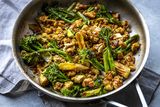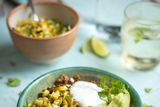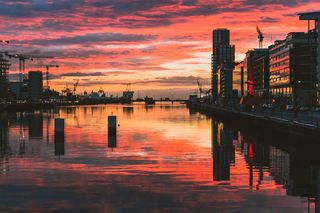Caffeine queens: Where exactly does your morning cup of coffee come from?
The latest must-drink brew is grown by women. Aideen Sheehan travelled to the hillsides of Central America to find out exactly where your cup of morning coffee comes from.
Ireland's growing legions of coffee connoisseurs will have spotted the latest must-have brew being rolled out across the country - coffee grown by women.
Bewleys has just launched Fairtrade Coffee, grown, processed and traded exclusively by women in Peru. It is available through its Coffee Project subscription service which delivers different coffees each month to dedicated coffee fans.
Meanwhile outlets, from the Dublin Food Co-Op to Organico in Bantry and Amnesty Freedom Cafes in Dublin and Galway, also offer a caffeine fix from importers Equal Exchange, that makes sure the women growing the beans get more of the p rice.
Cappuccino culture has made coffee the new wine, sparking a growing interest among foodies in how and where it's produced.
Consumers here now spend €221m a year and rising on Fairtrade coffee and food, and I travelled to Central America to trace the journey of coffee beans from mountainside to your cup, to find out how the price we pay benefits the families who grow it.
Honduras is officially the murder capital of the world because it's a crucial stepping stone for the drug trade between North and South America - if people were killed at the same rate in Ireland it would add up to over 7,000 homicides a year.
Armed guards patrol outside every restaurant and hotel and it's gunfire rather than an alarm startling me awake one morning.
For many people, eking out a living growing coffee is the only lifeline between them and precarious illegal emigration to the US, or taking their chances on the very mean streets of the nation's big cities.
Though it's estimated women do 60pc-80pc of the work producing the world's coffee, machismo still rules and they rarely reap the profits. However Mirna Inestroza is one of a growing number of female coffee farmers who now owns their own hillside farm.
Backed by Fairtrade support, Mirna has managed to expand her holdings to over six acres - large by Honduran standards.
The co-op she's a member of gets around €88,000 a year in Fairtrade premium - a bonus of €0.18 a lb above the standard global coffee price - in return for signing up to high environmental, labour and social standards.
For Mirna the benefits of this have ranged from being able to add an extra bedroom onto her home with her growing income - to building the self-confidence to demand help with the daily chores from her husband and two young sons.
"We held a workshop in the co-op where we discussed gender roles at home, it was an opportunity for the men to learn as well, and I have now asked my sons to help around the house more," she says.
The support Fairtrade gives to female coffee producers includes an equal say to male farmers in deciding how co-op profits are spent - letting them channel money into community health services and local schools.
For Maria Gomez in nearby Nicaragua, empowerment is no abstract nicety.
After years living with an abusive husband, she inherited a few mountainous acres of land to grow coffee on, and this income combined with emotional and practical support from her co-op, helped her make the decision to leave her husband - a bold step in this part of the world.
"Getting involved with the co-op helped me realise I did not need to put up with the way I was being treated, it's better to live on your own than accept that," she says.
As a child the bitter civil war between the Contras and the Sandinistas forced Maria to flee her home, so the only schooling she received was what she taught herself - but she's used her coffee income to give her own children the education they need to avoid the hardship she endured.
Fatima Ismael, who manages the Soppexcca co-op in Nicaragua, which is a major supplier to Bewleys in Ireland, says providing legal assistance with land title and building up confidence in women is transforming lives.
The Fairtrade premium it gets has literally saved women's lives by allowing the co-op put in a cervical screening programme, and run campaigns to prevent unwanted pregnancies and sexually transmitted diseases.
"Many women here start having babies at 14 or 15 and they keep on having them until their bodies are worn out and damaged, so learning about alternative choices that can help the whole family is very important," says Fatima.
It has also opened its own cafes to provide sought-after jobs as baristas for young people - and showcase their prize brew to the tourists in Nicaragua checking out one of Lonely Planet's most hotly tipped travel destinations.
Soppexcca gets €360,000 a year in Fairtrade premium for its beans, and many women members get a bonus for beans sold to niche brand Equal Exchange.
Around 40pc of the premium is spent on technical support to coffee growers to improve yields, with the rest spent on infrastructure, education, healthcare, youth projects and diversification.
Join the Irish Independent WhatsApp channel
Stay up to date with all the latest news














